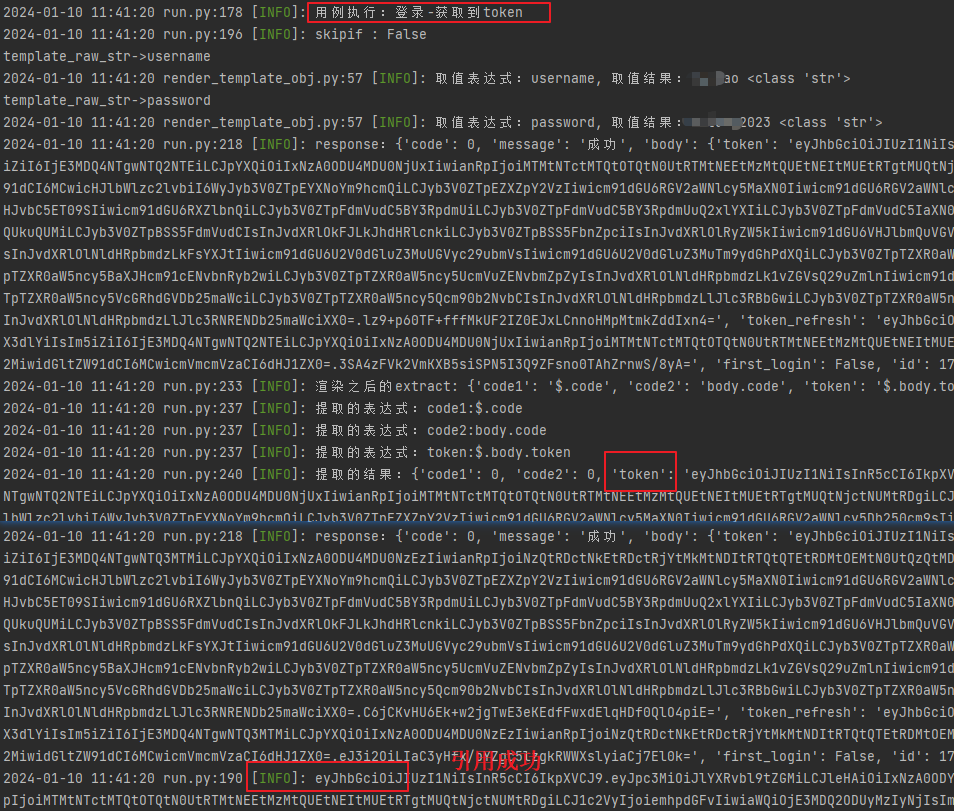关键字 开发-16 用例间参数关联
前言
在第8篇文章中,我们使用了extract从接口返回的response中提取了返回的字段值,那么这节将分析,如何将提取的值传递给下一个接口进行参数传递,以达到接口间的参数关联。
1. export提取
extract 提取结果后,之前是module 模块变量级别,现在需要提升到运行用例的session会话全局级别,可以用request内置fixtures来实现。
def run(self):
# 1.先获取到config中的变量variables
if not self.raw.get('config'):
self.raw['config'] = {}
base_url = self.raw.get('config').get('base_url', None) # 获取config中base_url
config_variables = self.raw.get('config').get('variables',{})
log.info(f'获取到的config中的变量:{config_variables}')
# export提取,config_exports变量定义,必须为list
config_exports: list = self.raw.get('config').get('export', [])
if not isinstance(config_exports, list): # config中的export必须要为list类型
config_exports = []
log.info("export must be type of list")
......
def execute_yaml_case(args):
"""执行yaml 中用例部分,根据这个函数动态生成其他测试用例函数"""
log.info(f"执行的参数: {args}")
# 更新fixtures的返回值,到容器中
self.context.update(args)
# 被谁调用
call_function_name = inspect.getframeinfo(inspect.currentframe().f_back)[2]
log.info(f'执行的内容: {case[call_function_name]}')
# ----------- 通过 config 获取 export 变量 ------
request_config = args.get('request').config
if not hasattr(request_config, 'export'):
request_config.export = {}
self.context.update(request_config.export)
case_exports = [] # 用例中需要导出的变量收集
# 模块变量优先级高
self.context.update(self.module_variable)
# ----------- export end ---------
......
for step in case[call_function_name]:
step_context = self.context.copy()
step_name = step.get('name')
if step_name:
log.info(f'用例执行:{step_name}')
step_name = render_template_obj.rend_template_any(step_name, **step_context)
render_template_obj.rend_template_any(step, **step_context) # 用例每步之前先渲染变量,方便上个接口提取给下个接口
......
elif item == 'extract':
....
# 增加,将导出的全部数据,更新到context中
self.context.update('extract_result')
elif item == 'export':
if isinstance(value, list):
for _export in value:
if _export not in case_exports:
case_exports.append(_export)
if step_context.get(_export):
export_dict = {}
export_dict[_export] = step_context.get(_export)
self.context.update(export_dict)
else:
log.error("export must be list type")
# ---------用例结束,更新 export 变量到全局 ------
for export_key in config_exports:
request_config.export[export_key] = self.context.get(export_key)
for export_key in case_exports:
request_config.export[export_key] = self.context.get(export_key)
if request_config.export:
log.info(f"export 导出全局变量:{request_config.export}")
# ---------更新export end ------
yml说明:test_ext5用例中,第一步是获取token参数,通过extract提取,然后通过export导出到用例全局中,下一步引用token的提取值。
# testcase/test_ext.yml
test_ext5:
-
name: 登录-获取到token
skipif: 20 > 50
api: api/login.yml
extract:
code1: $.code
code2: body.code
token: $.body.token
validate:
- eq: [$.code, 0]
- eq: [status_code, 200]
export:
- token
-
name: 步骤1
api: api/login.yml
print: ${token}
-
name: 步骤2
api: api/login.yml
print: ${token}
test_ext6:
name: 6666
api: api/login.yml
print: ${token}
运行。





